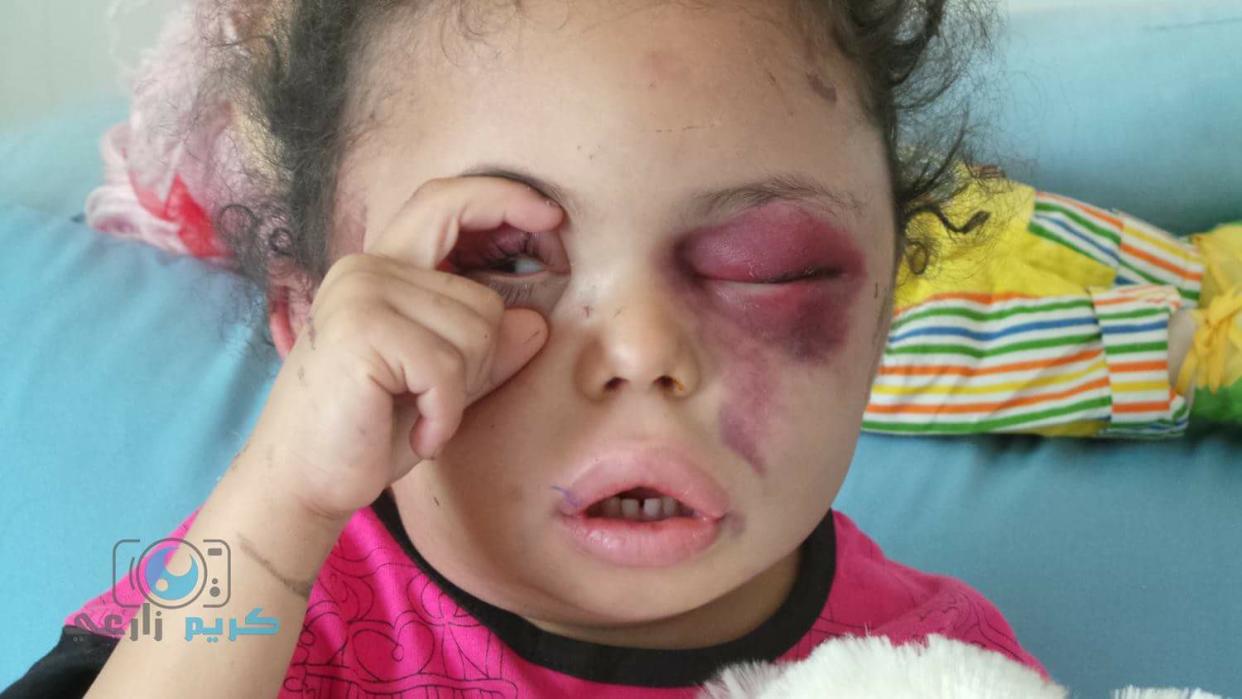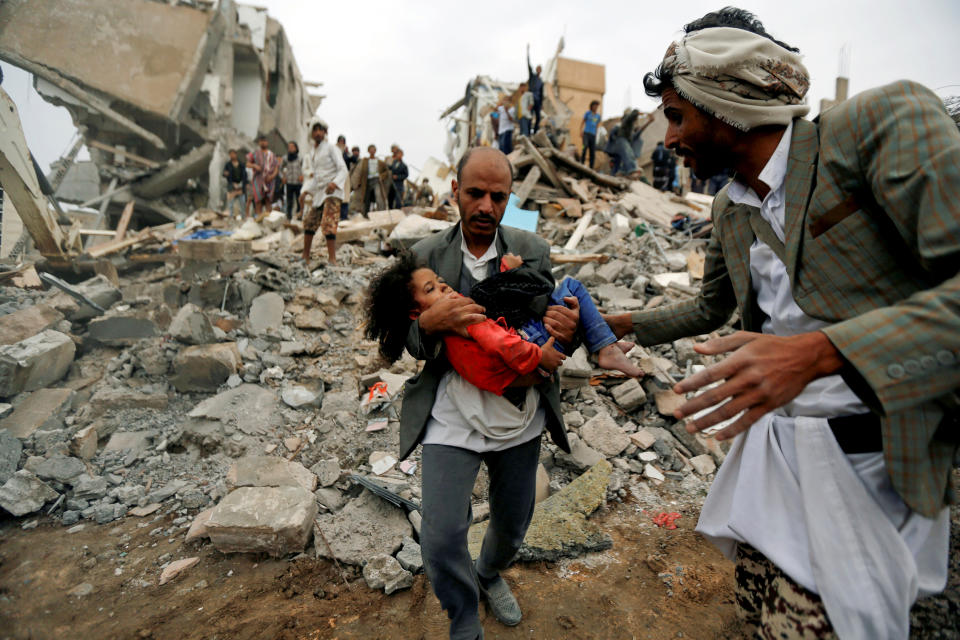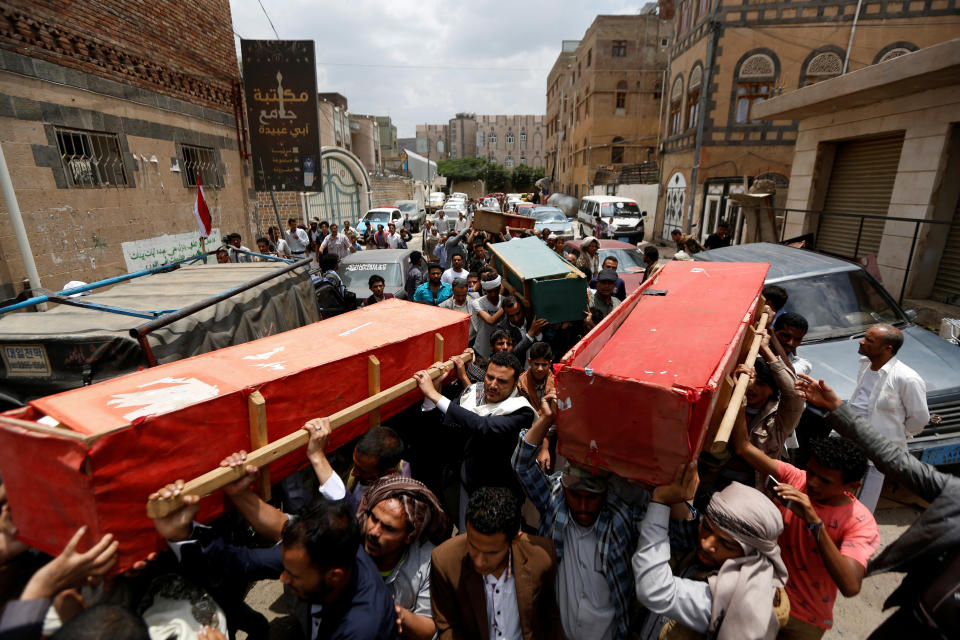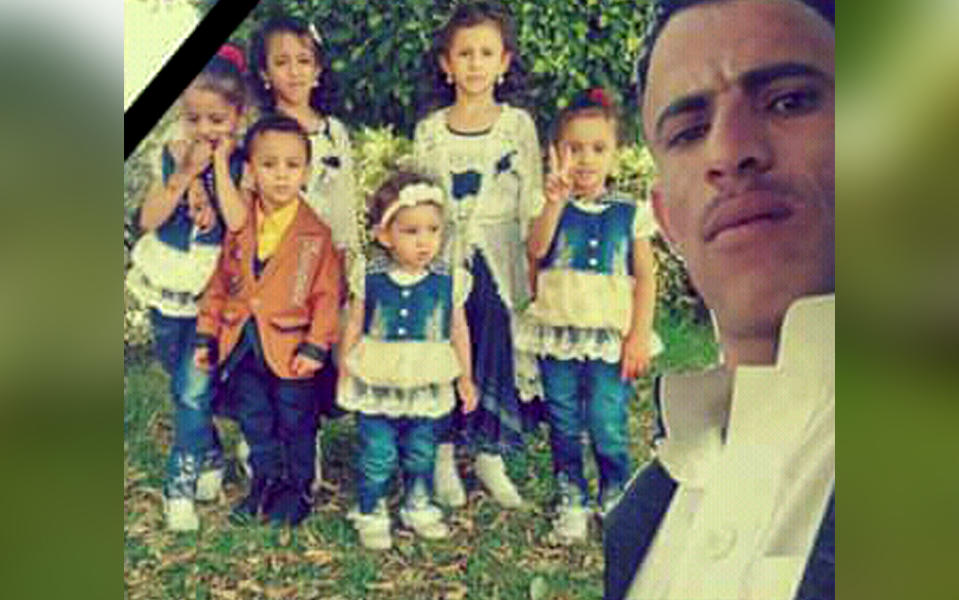An injured Yemeni child's image went viral. Then she disappeared to Saudi Arabia.

SANAA, Yemen — After a Saudi airstrike hit a residential apartment building in Sanaa in August 2017, 5-year old Buthaina Muhammad Mansour al-Raimi quickly became the public face of the humanitarian disaster unfolding in Yemen.
While at the hospital, pictures of her struggling to open her right eye, which was swollen shut from her injuries, went viral as social media users posted their own pictures imitating Buthaina. CNN covered her story, as did news outlets around the world.
The International Committee of the Red Cross condemned last year’s Aug. 25 attack that killed 16 people and injured 21 more as “outrageous,” and Saudi Arabia blamed the deadly strike, which killed Buthaina’s mother and father, all five of her siblings and an uncle, on a “technical mistake.”
While Buthaina’s case never attracted as much international coverage as that of Jamal Khashoggi, the Saudi journalist who was murdered and dismembered inside the Saudi consulate in Turkey, her image brought attention to the thousands of civilians who have died in the war. Saudi Arabia, which is leading a coalition involved in the Yemen conflict, says its goal is to dislodge the Houthi rebels who control large swaths of the country.
Now, over a year later, the Houthi government in Sanaa and members of Buthaina’s extended family are accusing Saudi authorities of kidnapping Buthaina in a bid to hide a powerful symbol of the war in Yemen, which has gone on for more than three years. While there is some dispute over who has legal guardianship of Buthaina, her family insists that no one agreed to send her to Saudi Arabia — which has led the military intervention in Yemen.
And her transfer to the Gulf kingdom appears to be anything but normal.
Buthaina’s journey to Riyadh, Saudi Arabia, started in September 2017, less than a month after the airstrike. According to an account provided to Yahoo News by Buthaina’s family members, Fudaad al-Mansoori, the head of a local nonprofit, approached Ali al-Raimi, an uncle who was caring for Buthaina, and proposed filming a documentary about the war in Yemen with the young girl in a leading role.
According to Waleed al-Raimi, Ali al-Raimi’s brother, they made the first shot on Sept. 20, 2017, in front of a now-demolished apartment building with Buthaina standing on the rubble along with other family members, and then went to the cemetery where Buthaina’s family members are buried.
The next day, they drove south to where similar bombings had taken place.

When the filming was finished, al-Mansoori suggested dinner at a restaurant even farther south, in an area that was not under Houthi control. Al-Mansoori drove in one car, and Ali al-Raimi in another with his wife, their three children, and Buthaina. As they approached their destination, some 16 armored vehicles blocked the road, according to the family’s account. Uniformed armed men surrounded the car and said they were from King Salman Humanitarian Aid and Relief Center, a charity created by the Saudi government to work in Yemen.
The men then asked Ali al-Raimi to come with Buthaina and his family to Riyadh, where she would receive treatment from the charity. When Ali al-Raimi declined, he and his family were forced into the armored vehicles and taken to Aden, then airlifted to Riyadh. From Aden, Ali al-Raimi managed to call a friend in Sanaa, asking him to alert his family that they had been kidnapped. From there, word spread quickly in Sanaa that Buthaina had been taken to Saudi Arabia.
Whether Ali al-Raimi or his family had some initial agreement with Saudi Arabia is in dispute. Al-Mansoori, the man accused of luring the family to the south, denies that he had any role in Buthaina’s alleged abduction and says that Ali al-Raimi had coordinated with the Saudi-led coalition. “He drove his car … some 500 km from Sanaa to Aden,” al-Mansoori said. “No sane person could imagine that someone lured a person through four provinces along with his wife and children, and his luggage, driving his own car and passing through Houthi-manned checkpoints and those manned by [Yemeni government] forces.”
If Ali al-Raimi did have an agreement with Saudi forces — something the family disputes — it apparently fell apart quickly. In Riyadh, according to Waleed, Ali al-Raimi was assigned to a man who identified himself as Nasser al-Otaibi, a Saudi foreign ministry official. Ali al-Raimi requested permission from al-Otaibi to leave the hospital where Buthaina was staying for a few minutes to go for a walk in a nearby park. Once outside the hospital, Ali al-Raimi recorded a video saying the Saudi coalition had kidnapped him and his family, and posted it on his Facebook page.
“I pleaded with the world to release my family, me and Buthaina and bring us back home immediately,” he said. “Buthaina’s case isn’t a single-family issue but rather a national cause. Buthaina is after all one of the thousands of Yemenis who have lost parents, siblings and their homes. The Yemeni cause can’t be waived. I didn’t arrive in Riyadh of my own free will.”
For Saudi authorities, Buthaina’s transfer to Riyadh quickly turned into a PR nightmare, with both the family and the Houthi government in Sanaa accusing Saudi Arabia of kidnapping her.
On Sept. 28, two days after Ali al-Raimi posted his video, Saudi Arabia’s state-controlled al-Arabiya television broadcast footage showing Buthaina at the King Salman Center in Riyadh and denied allegations that she had been abducted. The broadcast also accused the Houthi government in Sanaa of exploiting her case.
In spite of Ali al-Raimi’s public defiance, he told relatives back in Sanaa that the family was treated well for the first several months. Al-Otaibi offered him a job at Aramco, the Saudi state-owned oil company. In return, however, Ali al-Raimi told his brother, Waleed, that he was asked to sign a document relinquishing Buthaina’s rights to sue the kingdom for any damage or loss of lives as a result of the August strike. Ali al-Raimi said he refused.

Relations between Ali al-Raimi and Saudi authorities remained tense. Then, in July of this year, another of Buthaina’s uncles — the brother al-Raimi’s wife — showed up in Riyadh, willingly by all accounts. Shortly after, al-Otaibi’s aide asked Ali al-Raimi to attend a meeting, according to Waleed, who spoke with al-Raimi’s wife. Ali al-Raimi left for the meeting and never returned.
Nasser al-Otaibi did not respond to calls and texts seeking comment; an aide to al-Otaibi hung up the phone when contacted by a journalist, and did not respond to texts.
The next month, Buthaina and one of her cousins, Ali al-Raimi’s son, pleaded for their return to Yemen in a rare Facebook video posted by Ali al-Raimi’s wife. They asked for the release of al-Raimi and to bring the entire family back to Yemen. “Since when have you turned people into slaves while they were born free,” said Buthaina, quoting a well-known Arabic saying, with tears running down her face.
In early October, Saudi authorities, including female police, raided the apartment where Buthaina was staying with her aunt and cousins, and took them away. On Oct. 10, Ali al-Raimi’s wife made a brief call to a relative in Yemen and said they were now staying in a hotel with her brother, who had beaten her for not cooperating with the Saudi authorities.
In the meantime, Waleed al-Raimi searched for his brother, calling a dozen Saudi prisons. Finally, in a call to Al-Hayer, a prison where Saudi royals and businessmen were taken last year, he heard that “al-Yamani” — the Yemeni man — was being held there. On Oct. 26, Waleed pleaded with the prison administration to put his brother on the phone with their mother.
On Oct. 31, their mother’s phone rang, and Ali al-Raimi was on the other end. He told his mother that he wasn’t allowed to respond to any questions beyond confirming that he was fine. The phone call soon ended.
Buthaina, a potent symbol of the war in Yemen, remains in Riyadh with Ali al-Raimi’s wife and the recently arrived uncle, who is reportedly cooperating with Saudi authorities. “If she was really receiving treatment, she should be back home a long time ago,” said Khalid Muhammad Sa’ad al-Raimi, another of Buthaina’s uncles.
While Buthaina’s initial case captured worldwide media coverage, her mysterious transfer to Saudi Arabia has thus far failed to garner much attention. Khalid said that he spoke with U.N. Special Envoy to Yemen Martin Griffiths earlier this year about the Saudi kidnapping of Buthaina in a meeting during his tour of Sanaa, and that Griffiths told him he would raise the issue at the United Nations.
“We don’t have any information about this case,” Hanan Elbadawi, a U.N. spokeswoman, wrote to Yahoo News when asked about the meeting. “Maybe they spoke to some other U.N. official.”
In the meantime, there is no word on when, or even if, Buthaina will be returned to Yemen.
A spokesperson for the Saudi embassy in Washington, D.C. was unable to provide comment by press time. But following the publication of this article, a Saudi official disputed the kidnapping charge, saying Ali al-Raimi had arrived willingly to Riyadh. “The video referenced was produced to placate the Houthi militia who threatened them after their arrival [in Saudi Arabia] saying they were kidnapped, the official said. “The family was coerced to comply by sending this message to the Houthis who then turned around and tried to capitalize and make money off of the forced fabricated claim in the video.”
No member of the al-Raimi family backed up the Saudi claim about the Houthi threat, and the Saudi official offered no proof of threats. It is unclear how the Houthis would be able to threaten a family living in Saudi Arabia, or how they would make money from the video.
The official declined to comment on the record about Ali al-Raimi’s detention, other than to say it was over a “personal domestic dispute.” After Buthaina’s treatment, the official said, the family was given the choice of leaving “while awaiting the release” of Ali al-Raimi.
Buthaina and her “family are currently in comfortable housing and they are still free and mobile without any scrutiny,” the official said.
The King Salman Humanitarian Aid and Relief Center did not respond to a request for comment.

In an interview with Yahoo News, Fatma Muhammad Hussien, Ali al-Raimi’s mother — Buthaina’s grandmother — pointed to a picture of Buthaina’s father and siblings that hangs on the wall of her home. Everyone in the picture except Buthaina was killed in the airstrike.
“I don’t want money,” she said, a reference to allegations that Buthaina’s case is being used to extract compensatory payments from the Saudis. She blames the Saudi coalition for a war that has killed thousands of Yemeni civilians and has driven large parts of the country to the brink of famine.
“I’m not relinquishing my granddaughter,” regardless of what the Saudis offer, she says. “This is a nation’s cause.”
_____
Read more from Yahoo News:
The CIA’s communications suffered a catastrophic compromise. It started in Iran.
Ending the Qatar blockade might be the price Saudi Arabia pays for Khashoggi’s murder
How Robert Mercer’s hedge fund profits from Trump’s hard-line immigration stance
Trump’s target audience for migrant caravan scare tactics: Women
Photos: Nationwide protests held in support of Mueller probe



